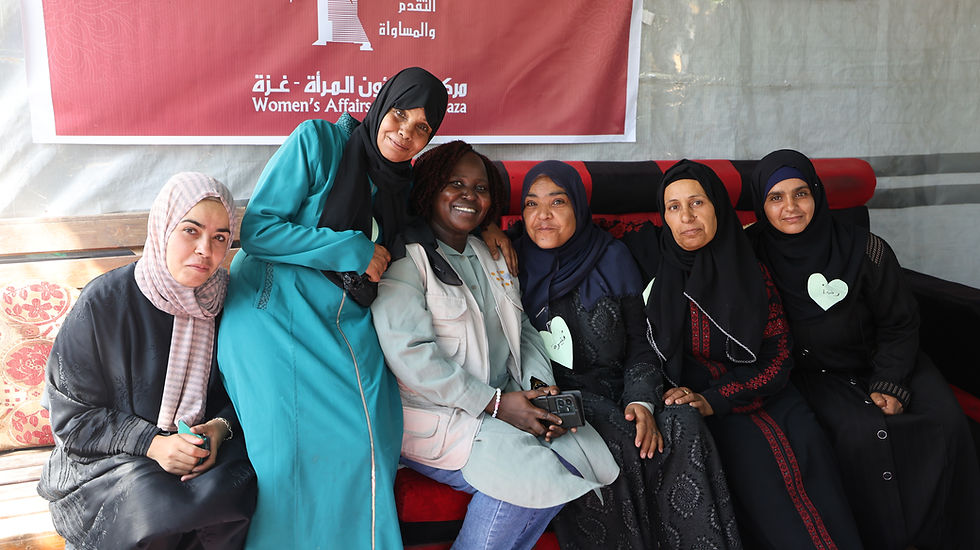WFP SBP Stories: Patrick Phipps (Philippines)
- Standby Partnership Network

- Jul 14, 2022
- 3 min read
Updated: Dec 7, 2023
Since 1991 WFP collaborates with a vast network of Standby Partners consisting of public and private organizations complementing WFP’s operational capacity by providing staffing, equipment, and services. Standby Partnerships are activated in various job positions and provide crucial support to WFP operations in emergencies or when WFP needs specific technical expertise. In 2021, 104 experts supported 37 Country Offices, 5 Regional Bureaux, and Headquarters. To request and deploy experts Standby Partners please reach out to WFP Standby Partnerships team in the Emergency Operations Division at: standbypartners@wfp.org.

In December 2021, Typhoon Odette swept through 11 of the Philippines’s 17 regions, leaving a trail of destruction in its wake, affecting close to 12 million people, damaging over 2 million houses and displacing thousands of people. In April 2022, Tropical Storm Agaton affected over 920,000 people across many of the same areas, causing more floods and landslides.

WFP launched an emergency response combining in-kind food (rice), value vouchers and cash. The Philippines crisis response hosts the largest contingent of Standby Partners, 14 deployees were rapidly deployed alongside 2 deployees already in field and their expertise is assisting in with emergency activities covering Cash, Logistics, Gender, Social Protection, Monitoring, Protection, Nutrition, Food Security, Telecommunications and Information Management.
We spoke with Patrick Phipps, an Irish Cash Specialist deployed by Irish Aid for a 6-month period to lead Cash-Based Transfers (CBT) efforts focusing on emergency preparedness and response, improved delivery mechanisms and capacity strengthening of national stakeholders.
Patrick joined WFP in the Philippines at a critical time when the Country Office was solidifying its place as the leading CBT agency in the country. “After taking early retirement in 2009 I wanted to use my humanitarian/development experience and cash-based transfers skills doing short-term consultancies. The Irish Aid emergency roster (Rapid Response Corps) afforded me this opportunity”. The Philippines mission was his 11th standby deployment and 4th with WFP specifically.
Patrick was already on the ground when the Typhoon hit the Philippines in the second half of December 2021. Odette generated torrential rains, violent winds, floods and storm surges, bringing havoc to the southern area, especially on rural communities that were still reeling from the economic backlash of the COVID-19 pandemic. “The extent of damage meant that the international community mobilized to assist Government and local authorities in a multi-sectoral response. The timing of this typhoon gave me relatively little settling-in time. It was all hands-on deck to ensure immediate life-saving interventions were put in place,” recalls Patrick.
With the Philippines Country Office’s focus changing due to the large-scale natural disaster and the need to switch to emergency mode, Patrick quickly adapted to the shifting priorities. His expertise ensured that the programme management team could put in place a comprehensive CBT strategy for Odette's response, guide WFP sub-offices on cash related interventions, negotiate with provincial authorities and conduct regular field visits. Furthermore, Patrick was key in establishing excellent relations with the Irish Embassy which resulted in additional Irish funding within days of the Typhoon Odette landfall.
“With his extensive experience, we were fortunate to have him onboarded around the time the Country Office was ready to kick into emergency response mode”, stated Country Director Brenda Barton who also praised his dedication and hard-work.
As well as dealing with the emergency response Patrick continued to lead WFP’s engagement in national level dialogue with Government and other social safety nets stakeholders, co-chaired the Inter-Agency Cash Working Group, worked with other partners to improve existing cash transfer delivery systems (including mobile transfers) and provided capacity building towards the development of a national social registry system. Community consultations helped tailor programme responses to local requirements, hence greater adhesion to cash processes among benefitting communities. “As demonstrated by the positive impact of the Typhoon response, improving social protection to help people mitigate shocks is important. Indeed, robust social protection policy can be leveraged to deliver humanitarian support efficiently”, he says.

Despite the challenging times during his deployment in the Philippines, the Odette emergency response has been a valuable experience for Patrick. “Being able to contribute to operations by drawing on my experience in cash and fundraising put my skills to practical use. The opportunity to enhance WFP’s leadership in the Inter-Agency Cash Working Group as co-chair also led to improved relationships with humanitarian partners”. He added, “teamwork and memorable field trips also come to mind. It was gratifying to mentor beneficiaries to upload cash to their mobile wallets and complete seamless electronic payments that can be used to purchase essential needs without having to incur hefty travel costs to the nearest financial service provider outlet”.
Reflecting on his many Standby Partnerships deployments, Patrick concludes: “living in a developed world is a privilege. We sometimes take for granted the simple things, turning a tap for water and flicking a switch for power and light not to mention having money in your pocket to look after your family. There is an onus of responsibility on all of us to give back whenever the opportunity arises”.




Comments